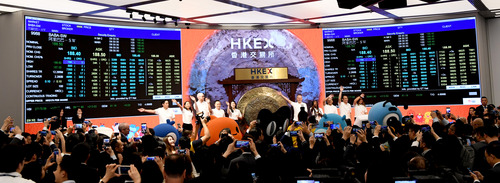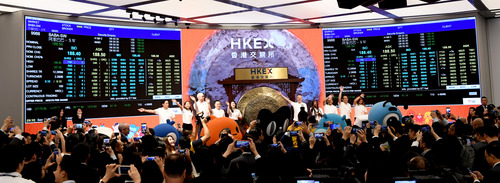
Photo taken on Nov. 26, 2019 shows a ceremony of Alibaba's debut on the main board of Hong Kong stock exchange in Hong Kong, south China.
BEIJING, Dec. 13 (Xinhua) -- China's H-share market may be bottoming currently, which might indicate a sound timing for entry, especially for some high-quality targets and popular sectors, reported Xinhua Finance on Monday, quoting several institutions.
By December 10, H-share market remained mostly slack in terms of performance in this year, with the Hang Seng Index (HSI), a market benchmark, down 11.88 percent, worse than part of the major global stock indices' performances.
Apart from HSI, industry indexes on the H-share market generally declined in the past days of 2021 and stocks of sci-tech sector became, in particular, one of the main factors that have weighed on the H-share market in 2021.
Among the 12 industry indices, the Hang Seng Composite Industry Index - Information Technology (HSCIIT) dropped 29.39 percent in the past days of 2021 ending December 10.
Cen Zhiyong, strategist with Plotio Securities Ltd. said the unsatisfying performance of H-share market in 2021 was caused to some extent by worries over uncertainties.
For instance, market worries on the change of the U.S. Fed's monetary policy and the spread of the coronavirus variant and other hearsays led to the downturn of H-share market in November 2021.
In the mid- and long term, however, once these temporary factors are gone, the optimism of H-share investors is likely to rebound, added Cen.
Alongside the solid bottom building of the H-share market and digestion of uncertain factors in 2021, the possibility for the upturn of the H-share market in 2022 is increasing, according to the report.
UBS Global Research expected the HSI to reach 27000 points by the end of 2020, hinting that the index might reap 12.5 percent of gains at maximum in the coming year. On Monday, the HSI opened at 24,242.26 points, up 246.54 points, or 1.03 percent.
UBS is optimistic about the future performance of stocks of local banks and retailers in Hong Kong, saying that when central banks of some developed economies may cut their assets purchasing and inflation rates are peaking, the real interest rates of these economies may be prompted up and stock prices of Hong Kong banks are usually positively connected with the running of real interest rate. What's more, local retail stocks in Hong Kong may benefit from part of the policy boosts.
Cen held a similar view, suggesting attention on stocks of part of local banks in Hong Kong in the short term and stocks of new energy vehicles for long-term investment. (Edited by Duan Jing with Xinhua Silk Road, duanjing@xinhua.org)




 A single purchase
A single purchase









